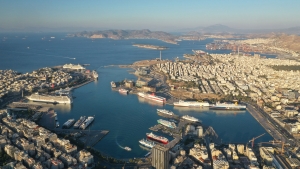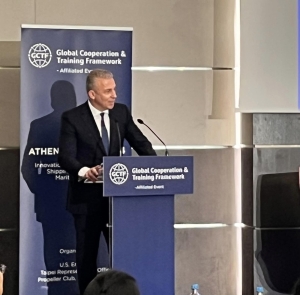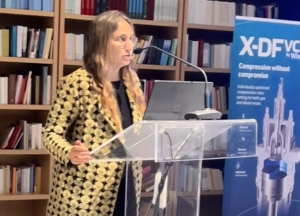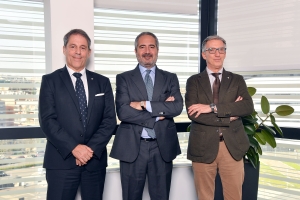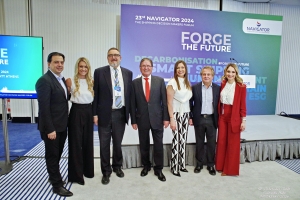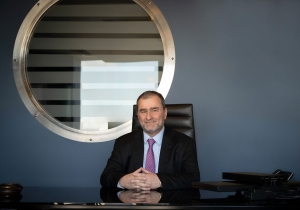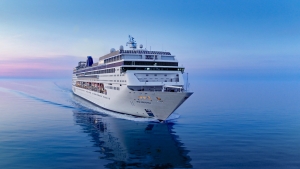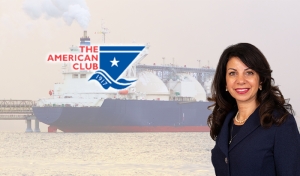- Home
elnavi
Despite the geopolitical events the Piraeus Port Authority S.A. has reported new highs in revenues and profits for 2023. In particular its total revenues reached €219.8 million, up by 12.9% or €25.2 million (€194.6 million in the 2022 fiscal year). Pre-tax profits reached €96.2 million compared to €74.7 million in 2022, marking a 28.8% increase. Profits after taxes also rose significantly to €66.8 from €52.9 million in 2022, reflecting a 26.3% increase. Finally, the proposed dividend per share surged by 29% to €1.34 from €1.04 in 2022. Notably, these results represent the highest performances in the company’s history for both revenue and profitability, marking the third consecutive year of improvement.
In individual core activities, the cruise sector witnessed a remarkable growth in 2023 in both approaches and passenger traffic. Total passenger traffic in 2023 amounted to 1,484,788 compared to 880,416 in 2022, marking a 68.6% increase. Moreover, there was a 12.4% increase in cruise ship calls, with 761 calls compared to 677 the previous year. Notably, there was a substantial rise in homeport ships and passengers. Homeport passengers surged by 110.4% (from 378,899 to 797,234), while 571 ships were homeported out of 760 in total. Strategic choices led to this significant growth, showcasing the company’s alignment with the pursued objectives enabling the port of Piraeus to significantly bolster the country's position by attracting high-profile tourist flows (homeport).
The car handling sector experienced a higher-than-expected increase in domestic car demand with Imported car registrations rising by 31.4% (from 116,732 to 153,381). Cargo handling declined by 30.0%, falling from 234,238 to 163,920 units.
Ship repair sector saw a 15.8% increase in dry dock (from 133 in 2022 to 154 in 2023) and despite a 3.6% decrease in the number of ship repairs (from 280 in 2022 to 270 in 2023) revenue rose due to extended ship stays in the zone.
The three container terminals maintained growth, with a 2% increase in total throughput to 5,100,920 TEUs, solidifying the port of Piraeus in the fourth position, among Europe's top ports.
The Chairman of Piraeus Port Authority S.A., Yu Zenggang, expressed his evident satisfaction with the company's continued upward financial trajectory, crediting the company’s employees for their crucial role in the port’s outstanding performance and emphasizing the faithful execution of the company’s plan and strategy yielding significant results. He highlighted that continued investments are planned to uphold Piraeus' top position among the leading ports in the Mediterranean and Europe.
ELNAVI Newsletter
More Information: ELNAVI,
19, Aristidou str., Piraeus 185 31,|
Tel.: +30 210 45.22.100, e-mail: This email address is being protected from spambots. You need JavaScript enabled to view it.
REGIONAL MARITIME SECURITY LIMITATIONS UNDER UNCLOS
Vasileios Lymperopoulos, managing director of Libero Group addresses the maritime security challenges under UNCLOS
Understanding UNCLOS: Scope and Purpose
UNCLOS, or the United Nations Convention on the Law of the Sea, is an international treaty that establishes a comprehensive legal framework for the governance and use of the world's oceans. UNCLOS aims to promote peaceful cooperation among nations, sovereign rights over maritime zones, protection and conservation of the marine environment, and equitable resource management. However, while UNCLOS provides a solid foundation for the establishment of a regional maritime security regime, it has certain limitations that need to be addressed. First, UNCLOS primarily focuses on the legal aspects of maritime governance and does not provide specific mechanisms for addressing maritime security challenges. Second, UNCLOS relies heavily on states' compliance with their obligations under the treaty, but enforcement mechanisms are limited. Lastly, UNCLOS does not adequately address emerging maritime security threats and challenges, such as piracy, illegal fishing, and maritime terrorism. These limitations hinder the effectiveness of UNCLOS as the sole foundation for a regional maritime security regime. Therefore, additional measures and agreements are necessary to supplement UNCLOS and address these issues effectively. The challenge is to reach “a global representative system” of Marine Protected Areas, recognizing that countries need to establish cooperative mechanisms at ecoregion level to address the limitations of UNCLOS in terms of maritime security (Silva et al., 2012).
Evaluating UNCLOS in Regional Maritime Security Contexts
When evaluating UNCLOS in regional maritime security contexts, it is important to consider its limitations as well as its strengths. UNCLOS provides a solid legal framework for the governance and use of the world's oceans, promoting peaceful cooperation among nations. The example of the Caribbean region, regional organizations such as the Caribbean Community has established their own maritime security regimes to address challenges specific to their region. However, these regional regimes may not align fully with the provisions of UNCLOS, and there can be inconsistencies in terms of jurisdiction and enforcement. However, regional organizations like the Caribbean Community have developed their own maritime security regimes; there are concerns about the effectiveness and practicality of these regional approaches. Critics argue that fragmented and inconsistent regional security regimes can lead to confusion and lack of coordination in responding to maritime security challenges. Additionally, the reliance on regional agreements may result in overlapping jurisdictions and conflicting enforcement mechanisms (Bateman, 2007), especially when it comes to transnational maritime threats such as piracy and illegal fishing |
Furthermore, the establishment of separate regional regimes could complicate international efforts to achieve a cohesive and unified approach to maritime security. This fragmentation may hinder the establishment of a universally applicable and enforceable maritime security framework at the global level. Therefore, while UNCLOS serves as a crucial foundation for maritime security, it is limited in its ability to address the specific challenges and realities faced by different regions.
Limitations of UNCLOS in Addressing Contemporary Maritime Threats
UNCLOS was primarily designed to govern traditional maritime issues such as navigation rights, territorial disputes, and resource exploitation. However, it may not adequately address emerging maritime security threats such as terrorism, piracy, smuggling, and illegal fishing. Additionally, UNCLOS does not provide specific guidance on how to effectively address these threats or establish robust mechanisms for regional cooperation and coordination. Furthermore, UNCLOS lacks enforcement mechanisms and relies on individual states to implement and enforce its provisions (Bateman, 2007). This reliance on voluntary compliance and enforcement by individual states can lead to gaps in implementation and inconsistent responses to maritime security challenges.
UNCLOS: A Framework for Cooperation or a Source of Conflict?
UNCLOS provides a framework for cooperation and the peaceful settlement of maritime disputes. However, it has also been a source of conflict, particularly when it comes to territorial claims and overlapping maritime boundaries. Furthermore, UNCLOS does not have the authority to intervene or mediate in disputes between states, which can further complicate efforts to establish regional maritime security regimes.
Case Studies: Successes and Failures of UNCLOS in Regional Disputes UNCLOS in the South China Sea Dispute
The South China Sea dispute serves as a prominent example of the limitations of UNCLOS in addressing regional maritime security challenges. UNCLOS was unable to prevent the escalation of tensions and conflicting territorial claims in the region (Song & Tønnesson, 2013). Additionally, UNCLOS does not provide a mechanism for resolving overlapping claims and enforcing decisions. In conclusion, while UNCLOS provides a foundational framework for maritime governance, it has limitations in addressing contemporary maritime security threats and establishing effective regional security regimes.
UNCLOS in the Aegean Sea
The Aegean Sea dispute between Greece and Turkey highlights the challenges of using UNCLOS as the foundation for a regional maritime security regime. UNCLOS does not provide clear guidance on how to address the complex issues of sovereignty and territorial disputes in the Aegean Sea (Larson, 1985). This lack of clarity and guidance has hindered the establishment of a comprehensive maritime security regime in the region, leading to ongoing tensions and incidents between Greece and Turkey.
The Future of UNCLOS in Regional Maritime Security Dynamics
The limitations of UNCLOS as the foundation for a regional maritime security regime highlight the need for additional mechanisms and agreements that can address the evolving nature of maritime security challenges. These mechanisms and agreements should take into account the complexities of territorial disputes, overlapping claims, and emerging threats such as piracy, terrorism, and illegal activities. Territorial disputes and overlapping claims are significant contributors to regional maritime security challenges. The South China Sea dispute is a well-known example, with multiple countries, including China, the Philippines, Vietnam, and Malaysia, making competing territorial claims over various islands and maritime zones. The lack of clarity and consensus on maritime boundaries has led to heightened tensions and even military confrontations in the region.
In the East China Sea, there is a longstanding dispute between China and Japan over the sovereignty of the Senkaku/Diaoyu Islands (Beckman & Sun, 2017), which has posed a persistent challenge to regional maritime security. Similarly, in the Arctic region, overlapping claims to maritime territories by Russia, Canada, Denmark, and the United States have raised concerns about potential conflicts and the need for effective security arrangements.
Emerging threats such as piracy, terrorism, and illegal activities further complicate the maritime security landscape. Piracy in the Gulf of Guinea and the waters off the coast of Somalia (Hong & Ng, 2010) has been a persistent concern, leading to disruptions in maritime trade and posing risks to the safety of seafarers. The threat of maritime terrorism, including attacks on commercial vessels and port facilities, has also become a pressing issue, highlighted by incidents such as the 2008 Mumbai attacks carried out by terrorists using the sea route to access the city.
Illegal activities such as unregulated fishing, smuggling of goods and narcotics, and human trafficking add another layer of complexity to maritime security. These activities often transcend national borders, making it challenging for individual states to address them effectively. This underscores the need for enhanced international cooperation and coordinated efforts to combat these transnational maritime threats.
In response to these challenges, regional initiatives and agreements such as the Regional Cooperation Agreement on Combating Piracy and Armed Robbery (Refworld | Security Council resolution 1816 (2008) [on acts of piracy and armed robbery against vessels in territorial waters and the high seas off the coast of Somalia], 2008) against Ships in Asia and the Djibouti Code of Conduct(Djibouti Code of Conduct, 2019) have been established to facilitate collective action in addressing maritime security threats. These initiatives underscore the importance of regional cooperation and coordination in addressing the limitations of UNCLOS and enhancing maritime security in specific geographic areas.
In light of these examples and challenges, it is evident that addressing territorial disputes, overlapping claims, and emerging maritime threats requires a multifaceted approach that goes beyond the provisions of UNCLOS. While UNCLOS lays the legal foundation for maritime governance, addressing contemporary maritime security challenges necessitates the development of complementary mechanisms and agreements that can effectively tackle these complex and evolving issues.
What needs to be with UNCLOS and Regional Maritime Security?
What needs to be done with UNCLOS and regional maritime security is the establishment of a cooperative mechanism that addresses ocean governance issues separately from the legal and political aspects of UNCLOS (Bateman, 2007). This cooperative mechanism can be based on the general framework provided by UNCLOS Part IX, but it requires political will and good sense to implement.
In several countries, the political will in terms of UNCLOS has brought positive results in the establishment of effective maritime security regimes. For example, in the South Pacific region, countries such as Fiji, Vanuatu, and Solomon Islands have shown strong commitment to UNCLOS principles and have actively worked towards the development of regional cooperation mechanisms for maritime security. These countries have recognized the importance of UNCLOS in addressing maritime security challenges and have taken proactive steps to align their national laws and policies with the provisions of the convention.
Furthermore, in the European Union, UNCLOS has served as a framework for cooperation among member states in addressing maritime security issues in the Baltic Sea and the Mediterranean. The political will demonstrated by EU member states has led to the development of joint initiatives and agreements that aim to ensure effective maritime security within the region (Law of the Sea Mechanisms: Examining UNCLOS Maritime Zones, 2014), demonstrating the positive impact of UNCLOS in promoting cooperation and collective action.
References
Silva, J Â G D., Ribeiro, R., Viras, A., &Grilo, C. (2012, June 8). Transboundary MPAs: a challenge for the twenty‐first century. https://doi.org/10.1108/14777831211232191
Bateman, S. (2007, September 1). UNCLOS and Its Limitations as the Foundation for a Regional Maritime Security Regime. Korean Journal of Defense Analysis, 19(3), 27-56. https://doi.org/10.1080/10163270709464140
Song, Y., &Tønnesson, S. (2013, July 1). The Impact of the Law of the Sea Convention on Conflict and Conflict Management in the South China Sea. , 44(3), 235-269. https://doi.org/10.1080/00908320.2013.808935
Larson, D L. (1985, January 1). Security issues and the law of the sea: A general framework. Ocean Development and International Law, 15(2), 99-146. https://doi.org/10.1080/00908328509545771
Beckman, R., & Sun, Z. (2017, December 9). The Relationship between unclos and imo Instruments. https://doi.org/10.1163/24519391-00202003
Hong, N., & Ng, A K. (2010, January 1). The international legal instruments in addressing piracy and maritime terrorism: A critical review. Research in Transportation Economics, 27(1), 51-60. https://doi.org/10.1016/j.retrec.2009.12.007
Refworld | Security Council resolution 1816 (2008) [on acts of piracy and armed robbery against vessels in territorial waters and the high seas off the coast of Somalia]. (2008, June 2). https://www.refworld.org/docid/48464c622.html
Djibouti Code of Conduct. (2019, January 1). https://www.imo.org/en/OurWork/Security/Pages/DCoC.aspx
Bateman, S. (2007, September 1). UNCLOS and Its Limitations as the Foundation for a Regional Maritime Security Regime. https://doi.org/10.1080/10163270709464140
Law of the Sea Mechanisms: Examining UNCLOS Maritime Zones. (2014, December 1). https://www.maritime- executive.com/article/Law-of-the-Sea-Mechanisms-Examining-UNCLOS-Maritime-Zones-2014-12-01
ELNAVI Newsletter
More Information: ELNAVI,
19, Aristidou str., Piraeus 185 31,
Tel.: +30 210 45.22.100, e-mail: This email address is being protected from spambots. You need JavaScript enabled to view it.
U.S. Embassy, Taipei Representative Office & Propeller Club, Port of Piraeus organized a very important seminar on Innovation and inclusion in the Shipping Industry in the framework of the Global & Cooperation Training Events. As it’s known GCTF Global Cooperation and Training Framework was established in 2016 as a platform to utilize Taiwan's strengths and expertise to address global issues of mutual concerns. The full partners (currently Taiwan, the United States, Japan, and Australia) regularly hold GCTF Joint Committee meetings to review events of the year and decide on prospective areas of cooperation for the coming year.
Mrs Chrysanthi Stefanou, Governor Propeller Club, Port of Piraeus opened the Athens Forum and presented the agenda of the event.
The forum addressed by Mrs Maria Olson, Deputy Chief of Mission, U.S. Embassy Athens
Ambassador Sherman Kuo, Taipei Representative office in Greece
Mr. Costis Frangoulis, President Propeller Club, Port of Piraeus and Dr. George Pateras President of the Hellenic Shipping Chamber who expressed their appreciation to Greek shipping industry the world’s biggest power in the seaborne trade.
In his speech Dr George Pateras gave a perspective of all alternative options in the future marine propulsion aiming at reducing carbon and GHG emissions.
He remarked that the current technology is premature and too expensive to produce new fuels and called for more research and cooperation with all International stakeholders in shipping.
Panel 1 discussed the issues of Innovation and Technology in Shipping and Moderated by Mrs. Helena Athoussaki, Chief Sustainability Officer, Motor Oil Group.
The panel included the following Speakers:
Mr. Panos Theodossopoulos, Chief Executive Officer, METIS Cyberspace Technology
Mr. Vasileios Petousis, Energy and Sustainability Manager, Seanergy Maritime
Mr. Elias Kariambas, Vice President, Regional Business Development, Greece, ABS
Mr. Seiichi Suzuki, Shipbuilding and Ship Machinery , Senior Ship Surveyor, Japan.
It was mentioned that Japan is the world’s 3rd largest shipbuilder having built more than 1,900 ships for Greek shipping companies at the Japanese shipyards. The speakers also said that Greek Shipping companies greatly support the sustainable development however there is a lack of standardization regarding the production of new fuels and therefore we have to focus more on installing energy saving devices and embracing digital tools.
The Panel II examined the topics of Inclusiveness and Sustainability and Ship Machinery in Shipping and Maritime Affairs.
The discussion was moderated by Mrs. Sofia Galani, Professor of Public International Law, Panteion University.
The above issues were addressed by the following speakers:
Mrs. Elpi Petraki, President WISTA International
Mrs. Ally Cedeno, Founder and President Women Offshore, US
Dr. Jiahn-Horng, Chen, President of Taiwan National Academy of Marine Research
Mrs. Yun-Ching Tseng, Director, R&D and Evaluation Department, TaiwanICDF
Mr. Christos Timagenis, Partner at Timagenis Law FIrm.
The speakers referred to the topics of climate change adaptation, ecological and environmental monitoring, sailing towards a sustainable and inclusive future and the EU ETS.
ELNAVI Newsletter
More Information: ELNAVI,
19, Aristidou str., Piraeus 185 31,
Tel.: +30 210 45.22.100, e-mail: This email address is being protected from spambots. You need JavaScript enabled to view it.
WinGD Expert Talk Greece 2024
In an effort to inform the community of Greek Shipping regarding the issues of the future marine propulsion trends and prospects the experts of WinGD presented the latest on WinGD’s efficient sustainable technologies.
The event took place at Stavros Niarchos Foundation and the following topics were addressed: X-DF2.0, Ammonia engines X-DF-A, Methanol engines X-DF-A, Variable compression ration VCR technology, electrification & hybrid solutions X-EL and WiDE.
Volkmar Galke executive Director of Sales gave a market overview marking that China still is the major builder with diesel fuel prevailing for the time being. LNG is dominant in DF as X-DF in LNGC segment. Containerships is 2nd strongest segment after LNGC. XDF-A will be LPG ready and convertible from 2027.
Marcel Ott GM Application Engineering referred to XDF - 2.0 iCER technology intelligent control by exhaust recycling was also presented a system that uses the full turbocharger capacity.
He also mentioned the VCR Variable Compression Ratio technology characteristics that influences the thermal efficiency of the engine.
Extensive VCR performance tests have been carried out and significant reductions of methane slip have been confirmed. The advantages of VCR also include GHG reduction OPEX savings.
Adrian Siegfried GM customer support, presented X-DF service experience which quickly increasing in numbers and in operation.
Carmelo Cartalemi GM Global Sales referred on Ammonia Engines X-DF-A and Methanol Engines X-DF-
Stefan Goranov GM sustainability solutions addressed X-EL & hybrid solutions and Alex Veveakis manager customer support explained the WiDE concept that a comprehensive, integrated system for creating value from engine and ship data.
Closing the event, Ms. Stella Tomazou, managing director of Technava, emphasized that WinGD is at the center of the energy transition of shipping with innovation and responsibility.
Technava counts 40 years of cooperation first as Sulzer and Wartsila and more recently as WinGD and expresses its pride in the innovations introduced by the group such as the RTflex engines that changed the propulsion of LNG Carriers by replacing gas turbines. With the entry of Greek shipowners in the field of LNG Carriers in 2004 and the installation of more efficient and economical engines on approximately 300 ships, WinGD established itself as a leading force in the field of marine propulsion.
Technava supports its customers in the decarbinisation pathway by representing about 100 manufacturers houses in the Greek shipping industry with responsibility focusing on research and development.
Photo1: George Aretaios, Theodore Contes Byron Tomazos
Photo 2: Valentios Valentis Alex Tomazos Dimitris Patrikios Alexander Alexandrpoulos
Other Photos: The WinGD experts
ELNAVI Newsletter
More Information: ELNAVI,
19, Aristidou str., Piraeus 185 31,
Tel.: +30 210 45.22.100, e-mail: This email address is being protected from spambots. You need JavaScript enabled to view it.
Eni, a global energy company, Fincantieri, one of the world’s largest shipbuilding groups, the only one active in all high-tech marine industry sectors, and RINA, a multinational inspection, certification, and engineering consultancy, have signed an agreement to develop joint initiatives for the energy transition. The partnership formalises the commitment to develop joint projects, in line with the partners’ strategies, to decarbonise the maritime sector in the medium to long term with the goal of Net Zero by 2050. Additionally, the establishment of a permanent global observatory regarding future technological, regulatory, and market developments will be evaluated.
The three companies will conduct a comprehensive analysis and evaluation of the most sustainable alternatives to support the maritime decarbonisation pathway. This will also be based on the development of complementary solutions to fuels already available for other hard-to-abate sectors. The partnership’s areas of interest also include an analysis of the reference energy infrastructure and the development of new logistic structures, including the investments that the sector requires.
Giuseppe Ricci, Chief Operating Officer for Energy Evolution at Eni, commented: “The collaboration with Fincantieri and RINA, two major Italian players, is a further step in our journey towards the transition and decarbonisation of maritime transport. To meet the objectives of the UN 2030 Agenda, it is important not only to manage what is immediate but also to act with a medium to long-term perspective, developing partnerships to create more sustainable solutions and products. The ability to network among the partners, with their wealth of skills and technological capabilities, can make a significant contribution to finding more effective solutions for decarbonising maritime transport and meeting the needs of shipowners and logistics operators, always leveraging a holistic approach”.
Pierroberto Folgiero, CEO and Managing Director of Fincantieri, said: “We are highly committed to supporting our clients in addressing the industrial challenges of the maritime energy transition, and this initiative is aimed at initially creating a hub of study to harness Italy’s extraordinary expertise in new technologies, novel fuels, and their profound industrial implications for the ship system. We are very pleased to join forces with Eni and RINA in an alliance to materialize existing solutions and to pave the way for the future with a proactive ecosystem approach. Indeed, new technologies must be industrialized on board ships, just as new fuels must be produced and distributed at the dock. Only with a concept of “operationalizing innovation” can we lead our industry and project our shipbuilding leadership into the future”.
Carlo Luzzatto, CEO and General Manager of RINA, said: “We strongly believe in the value of collaboration and the opportunities it brings, particularly when it involves players of international calibre such as Eni and Fincantieri. Together, we have the opportunity to share knowledge and experience and to contribute to more sustainable solutions that support the shipping supply chain. RINA brings to the partnership its engineering and technological skills, developed across various sectors, to support shipping in its journey towards reducing its carbon footprint, without excluding any energy options”.
The understanding may be the subject of subsequent binding agreements that the parties will define in compliance with the applicable legislation, including that relating to transactions between related parties.
Image: (left to right) Carlo Luzzatto, Pierroberto Folgiero, Giuseppe Ricci
ELNAVI Newsletter
More Information: ELNAVI,
19, Aristidou str., Piraeus 185 31,
Tel.: +30 210 45.22.100, e-mail: This email address is being protected from spambots. You need JavaScript enabled to view it.
C&A Stavros Kassidiaris S.A., a foremost provider of automation systems, is pleased to announce a dynamic collaboration with Eltrak S.A., a leading company worldwide in the industry of heavy equipment in shipping and industry.
The project is about the design and construction of control panels, deck generators (3000 KVA) power management controllers and distribution and starter panels for the auxiliary equipment, for 6 container ships. The company is also responsible for the installation of the electrical equipment.
For this Intriguing venture, C&A Stavros Kassidiaris S.A. representing prominent international manufacturers of electromechanical equipment, will utilize cutting-edge materials from Hyundai Electric & Energy System Co. Ltd and Selco Aps
This collaboration exemplifies C&A’s commitment to excellence and innovation, as we pool our expertise and resources to deliver exceptional results.
ELNAVI Newsletter
More Information: ELNAVI,
19, Aristidou str., Piraeus 185 31,
Tel.: +30 210 45.22.100, e-mail: This email address is being protected from spambots. You need JavaScript enabled to view it.
Aiming at the development of new ideas and proposals to face the challenges of shipping the 23rd Navigator 2024 – The Shipping Decision Makers Forum successfully concluded on March 13, 2024, at Grand Hyatt in Athens, Greece. Navigator Assembly, happening for the fourth consecutive year, stood out as the singular platform where over 20 leading shipping organizations converged, spearheading discussions on specialized solutions crucial for the industry's evolution. Among them, prominent academic clusters and universities lent their expertise, adding depth to the dialogue.
Amidst the backdrop of prevailing geopolitical complexities and global uncertainties, the Navigator Assembly emerged as a beacon of candid exchanges and visionary initiatives. Over 200 distinguished shipping professionals and international delegates representing 165 ship owning and service companies convened under the theme #ForgeTheFuture. Their collective determination to navigate through turbulent waters and fortify the industry's resilience resonated throughout the forum.
The Assembly witnessed the participation of members from the whole shipping community engaging in roundtable discussions covering five thematic topics: Decarbonization, Human Element, Smart Shipping, ESG (Environmental, Social, and Governance), and Maritime Supply Chain. These discussions were instrumental in identifying actionable steps to drive sustainable progress and shape the future trajectory of the Greek Maritime Cluster.
Danae Bezantakou, CEO of NAVIGATOR SHIPPING CONSULTANTS, welcomed the participants and stressed that, in the dynamic realm of shipping, amidst constant geopolitical challenges and global uncertainties, it becomes profoundly evident that addressing pressing issues and pioneering solutions are paramount. She also highlighted the belief in the power of synergy fuels collaborative efforts to overcome obstacles and contribute to the industry's resilience involving stakeholders from politics and academia, and rest sectors of the shipping community.
The forum commenced with welcoming remarks by Captain Dimitris Bezantakos, President of NAVIGATOR SHIPPING CONSULTANTS, setting the stage for a day of insightful discussions. Captain Dimitris emphasized the pivotal role of synergies in the maritime domain, noting their significance in driving progress and innovation. He also acknowledged the esteemed presence of the President of the Hellenic Chamber of Shipping, whose contributions enriched the gathering, and stressed the significance of empowering and educating the younger generation in shaping the industry's future.
In his welcoming remarks, George Pateras, President of the HELLENIC CHAMBER OF SHIPPING, underscored the urgent need for decarbonization and lamented the persistent postponement of environmental issues. He emphasized the importance of collective dialogue, as industry stakeholders, to address these challenges, recognizing that we are the drivers of change in the market.
Overall, the sentiment of fostering dialogue and supporting initiatives such as YES Forum was echoed, aimed at integrating young talent into the shipping industry.
Looking ahead, the outcomes of the Assembly will be presented at the 23rd NAVIGATOR 2024 – THE SHIPPING DECISION MAKERS FORUM, scheduled to take place in Chios & Oinousses from September 20 to 22, 2024. The forum will bring together industry leaders and stakeholders to exchange viewpoints, share knowledge, and shape the future of maritime.
Following the conclusion of the roundtable discussions, Danae Bezantakou, in her closing remarks, underscored the paramount importance of education in addressing the challenges facing the shipping industry. She emphasized the need for universities to play a pivotal role in preparing students for these challenges and ensuring alignment with the concerns and obstacles articulated by ship owning companies.
To further delve into this topic, esteemed professors from various universities were invited to share their insights:
- Vicky Apostolopoulou, Business Development Executive, School of Maritime Studies Metropolitan College
- Seraphim Kapros, Professor - UNIVERSITY OF THE AEGEAN
- Dimitrios Koubogiannis, Associate Professor - DEPARTMENT OF NAVAL ARCHITECTURE/SCHOOL OF ENGINEERING/UNIVERSITY OF WEST ATTICA
- Manolis Kavussanos, Director MSc in International Shipping, Finance and Management – AUEB
- Dimitrios Lyridis, Assoc. Professor - NATIONAL TECHNICAL UNIVERSITY OF ATHENS
- Angelos Pantouvakis, Dean and Professor & UNIVERSITY OF PIRAEUS
The success of the Navigator Assembly 2024 underscores the commitment of NAVIGATOR SHIPPING CONSULTANTS and its partners to drive innovation, foster collaboration, and promote sustainability in the maritime industry.
Sponsors: ABB, ABC MARITIME, AUSTRIACARD HOLDINGS, BENEFIT, COOL DYNAMIC, CROSSWORLD, CYGNUS, DNV, EDIT AUTOMATION, EY, EMBASSY OF PANAMA, FORTUNE TECHNOLOGIES, FRANMAN, GOLDEN CARGO, HILL DICKINSON, IMEQ, INMARTEK, KATRADIS, MARICHEM MARIGASES, MARINETRAFFIC (KPLER), METROPOLITAN COLLEGE, MOORE, NAPA, OCEANKING, ORIANI, PALAU INTERNATIONAL SHIP REGISTRY, POLFORCE, RIDGE GLOBAL EUROPE, SHIPGLIDE AIR LUBRICATION SYSTEMS, SEABRIGHT, SEKAVIN, THE AMERICAN P&I CLUB, THE MARSHALL ISLANDS REGISTRY, Port of Thessaloniki (ThPA S.A.), TOTOTHEO MARITIME, UK P&I, VSHIPS.
ELNAVI Newsletter
More Information: ELNAVI,
19, Aristidou str., Piraeus 185 31,
Tel.: +30 210 45.22.100, e-mail: This email address is being protected from spambots. You need JavaScript enabled to view it.
Chair of IUMI’s Ocean Hull Committee highlights need for resilience and innovation amid supply chain threats and energy transition
A leading underwriter has called on marine insurers to adopt a dynamic, flexible and contingency-based approach to their business if they are to safely navigate a new, volatile landscape where disruption of supply chains is becoming a norm.
According to Ilias Tsakiris, Chair of the Ocean Hull Committee of the International Union of Marine Insurance (IUMI), the marine insurance sector needs to shore up its resilience and embrace innovation in the face of a host of new and developing risks.
Speaking at Marine Insurance London 2024, Mr. Tsakiris cited the Covid-19 epidemic as a wake-up call for the business world to recognise the fragility of supply chains and the reality that “storms can come out of nowhere.” Since then, Russia’s invasion of Ukraine, the ensuing sanctions, and other geopolitical upheavals have only reinforced the lesson that for a transportation industry that has grown used to a just-in-time mind-set, it is now imperative to have “just-in-case” strategies.
“Our traditional trade routes are not safe anymore and the supply chains will face challenges bigger than the ones faced during the pandemic,” he told the conference. “The bottom line is that risks are abundant, and the transformation to the just-in-case model is the only option for companies, including insurers, seeking to operate in this environment.”
As trust and reliability gradually assume greater importance, supply chain management practices are already adapting with many major manufacturers friendly-shoring, near-shoring or re-shoring operations. Such strategies held significant implications for global seaborne transportation, Mr. Tsakiris argued.
At the same time, it is essential for insurers to keep abreast of the shifts happening in the industry’s energy transition as shipping strives to meet the target of emitting zero greenhouse gases by 2050, said Mr. Tsakiris. There is a need for innovative infrastructure and regulatory incentives to facilitate this transition that will have a significant impact on operational logistics and cost structures within the industry.
Mr. Tsakiris identified a plethora of different risk areas facing insurers in the sector, with challenges ranging from increased idle time and route diversions to cybersecurity vulnerabilities and regulatory compliance complexities. Attention to digital solutions, sustainable initiatives and strategic diversification were all necessary to effectively mitigate the array of risks, he argued.
“The path forward” for marine underwriters was developing a holistic approach integrating technological adeptness, client-centric innovation, a proactive policy towards emerging needs and a commitment to sustainability. According to Mr. Tsakiris, the value of continuous learning, adaptability and cooperation cannot be overstated. “In a world where established assumptions are being continuously challenged and new technological advances promise to revolutionise industries, standing still is not an option,” he said.
ELNAVI Newsletter
More Information: ELNAVI,
19, Aristidou str., Piraeus 185 31,
Tel.: +30 210 45.22.100, e-mail: This email address is being protected from spambots. You need JavaScript enabled to view it.
The Cruise Division of the MSC Group, made up of MSC Cruises and Explora Journeys, revealed details on its Greek cruise season 2024.
MSC Cruises will have six different ships calling to Greek shores making over 400 calls to nine different island and mainland destinations around the country, including a ship homeporting in Piraeus.
Not only this, but MSC Cruises will homeport a ship in Greece for a whole winter season for the first time in 2024-25 thus extending the cruise season in line with the country’s wider five-year tourism development plan to extend the core visitor season. MSC Sinfonia will sail from her home port in Piraeus on seven-night itineraries, including Corfu.
This year, MSC Cruises’ ships will begin calling Greek ports in March, marking the start of year-round operation.
The new season also sees increased calls to certain ports including Cefalonia, Katakolon, Zakynthos and Corfu, reducing pressure on destinations such as Santorini and Mykonos.
Meanwhile Explora Journeys, the luxury lifestyle ocean travel brand of the MSC Group, will call to 21 Greek ports in 2024, with many of EXPLORA I’s journeys offering convenient embarkation and disembarkation in Piraeus. The brand’s first luxury ship offers a truly transformative travel experience with 461 ocean facing suites and a guest to host ratio of 1:1.25. Ports of call for EXPLORA I in Greece include Katapola (Amorgos), Paros, Patmos and Corfu.
This traffic will also support wider tourism and economic impact in the region thanks to the ships’ embarkation ports in Greece, which will see a large percentage of guests flying into Greek airports from all over the world, with many extending their holiday at sea with stays pre or post-cruise ashore in Greek resorts and cities.
Supporting this land-based economic benefit are the shore excursions taken by guests sailing in the region. MSC Cruises offers over 40 different shore excursions across all Greek destinations, using entirely local suppliers, and incorporating tours, tickets and visits to local Greek businesses. These excursions not only support local economies, but encourage guests to immerse themselves in Greek culture, taste Greek cuisine and learn about Greek history.
It might be that guests choose to visit the organic farm near Katakolon to savor the ouzo and learn about soap production or taste local wine and spectacular fresh olives just outside of Zakynthos, in each destination MSC Cruises offers guests a range of excursions to help stimulate local economies and showcase Greek culture.
About MSC Cruises
Headquartered in Geneva, Switzerland, MSC Cruises is the world’s third largest cruise line and the market leader in Europe, South America, the Middle East and Southern Africa, with a strong and growing presence in North America and the Far East.
The MSC Cruises fleet consists of 22 modern ships with three new vessels due to be launched in 2025, 2026, and 2027. The Company operates in more than 100 countries around the world, offering cruises across five continents, calling at more than 300 destinations and welcoming more than 180 different nationalities on board.
MSC Cruises is firmly committed to achieving net zero greenhouse gas emissions for its marine operations by 2050.
ELNAVI Newsletter
More Information: ELNAVI,
19, Aristidou str., Piraeus 185 31,
Tel.: +30 210 45.22.100, e-mail: This email address is being protected from spambots. You need JavaScript enabled to view it.
The American Club has reported relatively moderate drops from the year-on-year renewal results, which reflects overall stability within the context of recent challenges as well as its de-risking strategy.
Gross tonnage for the Club’s Class I (mutual P&I) entries stands at 22.5 million, down by approximately 2.5 million compared to inception one year earlier, with a relative premium income drop of 6.5% over the period. Its Class II (mutual FD&D) portfolio followed a similar shift, while its Class III (charterers’ liability) business is poised to increase by about 5% in 2024 by comparison with the previous twelve months. Initial combined loss ratio for the 2023/2024 policy year is tracking at 103% as of December 31, 2023 with an improving trajectory.
Eagle Ocean Marine, the Club’s fixed premium facility, which serves the operators of smaller vessels in local and regional trades, continues to benefit the mutual membership, with its overall historical net loss ratio now standing at 85% with the 22/23 and 23/24 facility year running below 70%, while the current 23/24 facility year relatively benign but still in an active period of development.
The Club’s Board had mandated an overall target increase in expiring premium of 7.5% for the 2024 policy year. As the overall combined loss ratio of renewing tonnage has continued to improve, the cash rise year on year on renewing business achieved was 4.2%, net of the downward adjustment in the IG reinsurance program cost for 2024 passed on to the Members in the usual manner. Augmenting the premium position were terms changes calculated to have a value of another 1% against net premium resulting in an overall increase of 5.2% on renewing premium. In terms of the average premium dollar per gross ton from expiry of the 2023 policy year to inception of the 2024 policy year, this increased by 6.4%.
Speaking in New York earlier today, Tom Hamilton, the Chief Underwriting Officer of SCB, Inc., the Managers of the American Club, said: “The 2024 renewal campaign for the American Club built on the successes of recent renewals, focusing on rate adequacy and continued refinement of its portfolio and evidenced the support of its core, loyal membership. This is highlighted by a high retention rate amidst challenging times. We are grateful for the support of members and brokers around the world. The American Club commences the 2024 policy year in a solid position with premium income for P&I, FD&D and charterers’ liability classes, along with the contribution from Eagle Ocean Marine, in excess of $130 million and we are encouraged by the expectation for growth across all classes over the course of 2024/2025.
Dorothea Ioannou, the Chief Executive Officer of SCB, Inc., also commented on the Club’s recent results: “While the growth of the two preceding renewals has slightly retreated, this was partly deliberate through de-risking strategies, and partly natural as a result of S&P’s downgrade. The Club’s premium and tonnage volume remains at historically high levels, reflecting 30% more in premium and 20% more in tonnage as compared to the 2021 policy year, with consistently improving combined loss ratio results. Furthermore, the high retention levels of renewing tonnage, in the face of extraordinary disruption, is a testament to the strength of relationships within the Membership and acknowledgment of the American Club’s service. The Club represents a significant and important voice in the industry, and in the International Group. We have and will continue to ensure that it is heard.”
The American Club
American Steamship Owners Mutual Protection and Indemnity Association, Inc. (the American Club) was established in New York in 1917. It is the only mutual Protection and Indemnity Club domiciled in the entire Americas and its headquarters are in New York, USA. The American Club has been successful in recent years in building on its US heritage to create a truly international insurer with a global reach second-to-none in the industry. Day to day management of the American Club is provided by Shipowners Claims Bureau, Inc. also headquartered in New York.
The Club is able to provide local service for its members across all time zones, communicating in eleven languages, and has subsidiary offices located in London, Piraeus, Hong Kong, Shanghai and Houston, plus a worldwide network of correspondents. The Club is a member of the International Group of P&I Clubs, a collective of thirteen mutual which together provide Protection and Indemnity insurance for some 90% of all world shipping.
The American Club also operates a fixed premium facility, Eagle Ocean Marine (EOM), aimed at the operators of smaller vessels in local and regional trades. Since it commenced underwriting in 2011, EOM has enjoyed considerable success in building a growing footprint in this specialist market and generating strong profitability for the Club.
P&I Insurance
Protection and Indemnity insurance (commonly referred to as "P&I") provides cover to shipowners and charterers against third-party liabilities encountered in their commercial operations; typical exposures include damage to cargo, pollution, death/injury or illness of passengers or crew or damage to docks and other installations.
Running in parallel with a ship's hull and machinery cover, traditional P&I cover distinguishes itself from usual forms of marine insurance by being based on the not-for-profit principle of mutuality where Members of the Club are both the insurers and the assureds.
Image: Dorothea Ioannou, CEO of Shipowners Claims Bureau, Inc., Managers of American Steamship Owners Mutual Protection & Indemnity Association, Inc.
ELNAVI Newsletter
More Information: ELNAVI,
19, Aristidou str., Piraeus 185 31,
Tel.: +30 210 45.22.100, e-mail: This email address is being protected from spambots. You need JavaScript enabled to view it.




